Nathalie Ceron '26, Law, History, Culture and Risk Management Minor
Aria Dehghani Champiri '26, Biotechnology.
Natalie Darlene Rubio '27, Environmental Engineering, Spatial Studies Minor
Tiffany Rodriguez '25, Pharmacology and Drug Development
Nelson Henriquez '25, Geodesign
Valeria Lopez '25, Health and Human Sciences
Kennedy Phillips '27, Public Policy
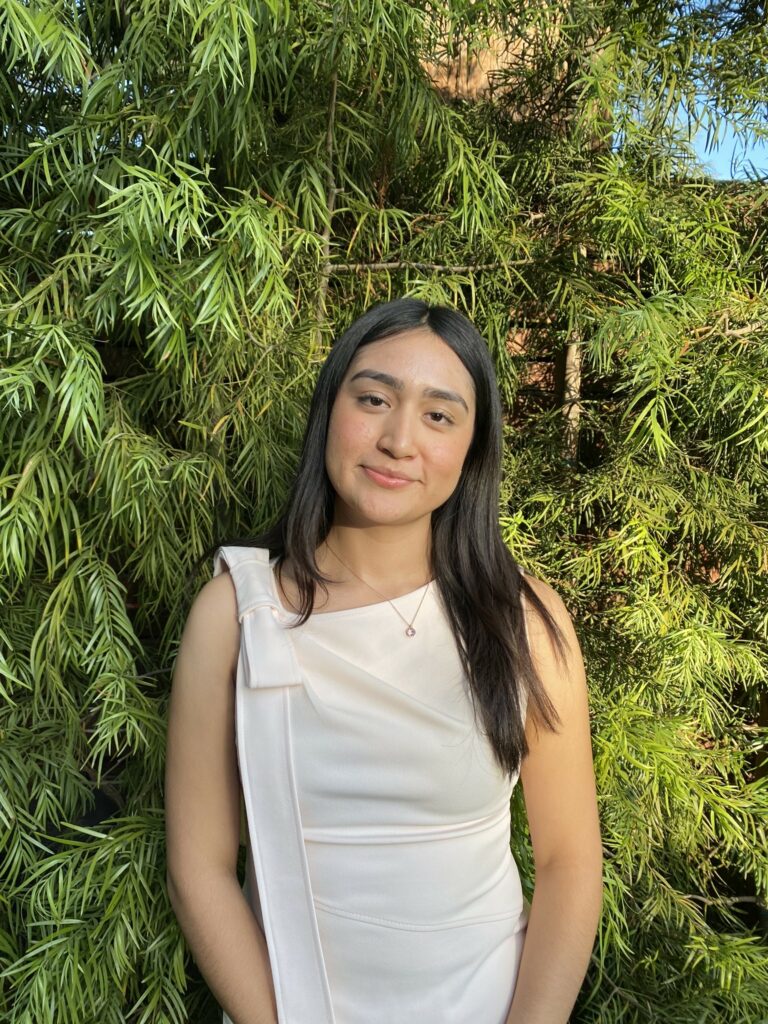
How do you hope to make a difference in environmental health? I hope to make a difference in environmental health by participating and engaging in research that addresses trends seen in underserved communities. As a participant in the EH Matters internship I will be a part of the MADRES Program which will allow me to dive deeper into maternal risks from environmental stressors. I hope that my participation within the program will expand community engagement and data collection to better address the needs of mothers and children.
What led you to pursue the EH MATTERS internship?
The EH MATTERS internship program offers a unique opportunity that highlights my values and interest in community engagement and research. The unique experience of being able to work alongside a cohort of students passionate about diving deeper into their communities was inspiring. I am excited to work alongside other community members and learn more about environmental health. Growing up in East Los Angeles, there were rare instances throughout my education and experience that allowed me to fully engage in environmental health issues. Being a participant in EH MATTERS will allow me to also engage and inspire my community to be involved in environmental health.
How do you see this program helping to drive your future?
The EH MATTERS will help drive my law and advocacy interests in a unique manner. Many environmental health issues have to do with politics and advocacy. More specifically, it is important to uplift communities that have not felt heard within their legal systems. One of the ways that many communities have been silenced has been through environmental health. This program is allowing me to have the unique experience of conducting research that will help steer my advocacy work in the future.
How do you want to make a difference in public health/environmental health outside of the classroom?
Outside of the classroom I hope to make a difference in public health and environmental health by not only listening and engaging with my community but by researching and adapting new scenarios that will create a better environment for underserved communities. With the data gathered I hope to find ways and immerse myself in different areas that can lead to a positive change.
What message would you like to share with other students wanting to pursue an internship in environmental health?
Give yourself the opportunity to explore the internship even if environmental/ public health does not correlate with your intended study or career path. Although environmental health impacts everyone, some communities are disproportionately impacted. If you are interested in learning and researching about your community, apply!
What diverse perspective do you bring to EH science, why is it important to have diverse voices and experiences in EH?
As a first generation, Chicana student I bring a unique perspective that connects me with many communities that are impacted by environmental health. My identity allows me to understand the sacrifices and struggles that Latine families hold. It is important to carry diverse perspectives and diversity within EH to propel forward a new generation of individuals that feel seen and heard within environmental health. Having diverse voices also allows individuals to connect within the communities that they are working with, which in turn produces better results that guide research.
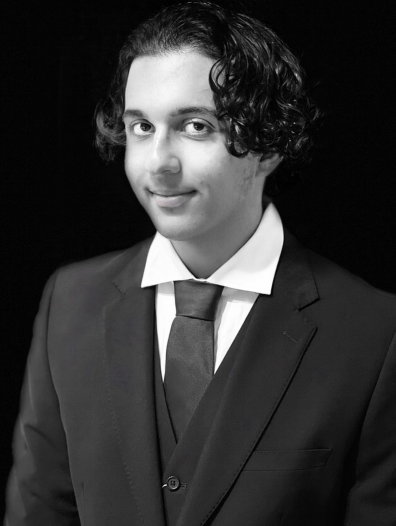
How do you hope to make a difference in environmental health? Through research and science, I hope to contribute and raise awareness about the multifaceted dangers of polluting our environment, and the many and varied effects it can have on the general population.
What led you to pursue the EH MATTERS internship?
This internship offers a comprehensive experience to get into the field of environmental health research, naturally, I knew that attaining this internship would jumpstart the prospect of achieving my goals.
How do you see this program helping to drive your future?
This program will allow me to become an experienced researcher with the help and support of motivated students and world-class faculty..
How do you want to make a difference in public health/environmental health outside of the classroom?
I’ve already been an advocate of environmental health ever since taking an environmental science course in my junior of high school. I hope that this internship can further enhance my knowledge so I can further contribute to my platform.
What message would you like to share with other students wanting to pursue an internship in environmental health?
Don’t be afraid to share your passions and personal stories that led you to pursue an internship in environmental health.
What diverse perspective do you bring to EH science, why is it important to have diverse voices and experiences in EH?
As an immigrant, first-generation student who has lived in other countries I have experienced living in places with little to no environmental policy or regulations. As a result, the water is much more polluted, the air is hazardous to sensitive populations, and even farmland and soil contamination is rampant. The United States is more focused on environmental health and policy, but there is still much work to be done. I believe that these diverse perspectives are important because they showcase how environmental health and policy is not just a regional or national issue, but an international issue, and through the research that we do, we can influence and help policy all over the world.
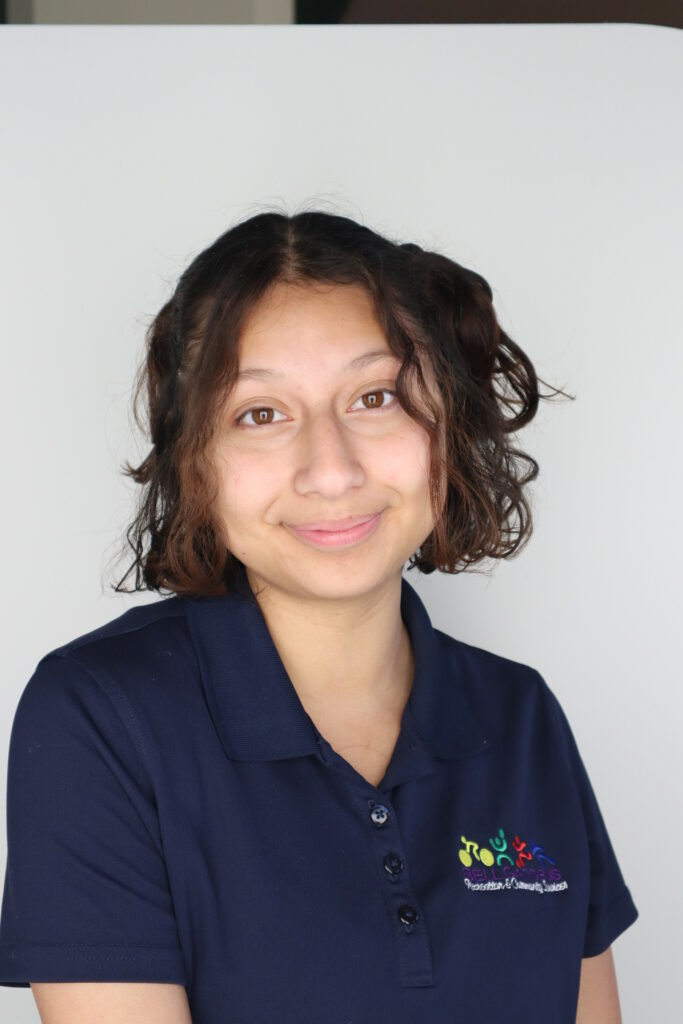
How do you hope to make a difference in environmental health? Growing up in a community directly affected by the presence of the 710 freeway, railroad tracks, industries, and traffic congestion near my home, I am committed to making a positive impact on environmental health. My primary focus is on advocating for environmental justice, ensuring that marginalized communities have the fundamental right to breathe clean air. I look forward to delving deeper into industrial pollution and its implications on community health. As I pursue a career as an environmental engineer and activist, my goal is to contribute meaningfully toward creating a healthier and sustainable environment for all.
What led you to pursue the EH MATTERS internship? I have always had a passion for planet Earth, ensuring that I recycle, do not litter, and plant trees in different cities. As a youth advisor with the Los Angeles County Department of Public Health, I planted 18 trees at my high school and provided an additional 12 trees to the community, aiming to safeguard community health from the impacts of industrial pollution.
I furthered my involvement in environmental justice by participating in the USC Environmental Justice Youth Fellowship. During this fellowship, I conducted soil contamination tests for lead in parks between Los Angeles and Malibu. The results revealed alarming levels of soil lead contamination in Los Angeles parks, surpassing recommended safety limits, while Malibu remained within the safe threshold.
Having witnessed these disparities, I am drawn to the EH MATTERS internship as an opportunity to extend my research on environmental injustice. I aspire to contribute to the development of effective solutions that protect community health and address the environmental challenges faced by marginalized communities.
How do you see this program helping to drive your future? I see this program as a crucial stepping stone toward a career dedicated to enforcing regulations on industries and protecting community health from environmental injustice. The opportunity to network with community organizations, governmental agencies, and USC faculty through this program is invaluable, providing me with insights for addressing environmental disparities. One of the key benefits I anticipate from this program is the enhancement of my skills in spatial analysis and mapping. This benefit will allow me to have a deeper understanding of the effects of industrial pollution on resilient communities and will empower me to make informed decisions and contribute to environmental advocacy.
How do you want to make a difference in public health/environmental health outside of the classroom?
My commitment to making a difference in public health and environmental health extends to hands-on initiatives. I aspire to contribute by actively participating in tree-planting initiatives with nonprofit organizations in various cities across Los Angeles. Engaging with community organizations is a cornerstone of my approach, and my current involvement in Metro’s Community Leadership Council exemplifies this commitment.
Within the council, I advocate for green initiatives, emphasizing the importance of urban greening and the establishment of air quality monitoring stations for the Los Angeles region. The joy I derive from giving back to the community is profound, serving as an expression of gratitude to the community that has supported me for 19 long years.
What message would you like to share with other students wanting to pursue an internship in environmental health? To those who desire to pursue an internship in environmental health, I encourage you to approach this opportunity with curiosity and a thirst for knowledge. Do not hesitate to ask numerous questions, absorbing as much information as you can. Take advantage of your resources and network with those around you.
Don’t be afraid to voice your needs and aspirations, and set clear goals for yourself as you enter this exciting new phase. It’s okay to not have all the answers initially, but I hope you can use this as motivation to push yourself to new heights. I wish you the best in pursuing your goals and the field you choose to explore.
What diverse perspective do you bring to EH science, why is it important to have diverse voices and experiences in EH? I am able to bring a diverse perspective to EH science by being among the small percentage of students who commute to USC, bridging the gap between the campus and the surrounding community. My vision is to foster sustainable communities within resilient cities, driven by a profound gratitude for the unwavering support of my community, despite facing environmental challenges. As a first-generation Latina student raised by grandparents who struggled with asthma, my personal experiences have instilled in me a deep commitment to promoting good health and sustainability in communities facing similar adversities.
I aim to honor the desires and needs of my community by actively contributing to the well-being of communities similar to my own. The importance of diverse voices and experiences in EH cannot be overstated. By bringing multiple perspectives to the table, EH is enriched with a strong network of bright minds. These diverse viewpoints not only enhance the program, but also ensure the program is inclusive, effective, and considerate of the unique challenges faced by different communities. Diversity in EH is the key to building a healthier and more equitable future.
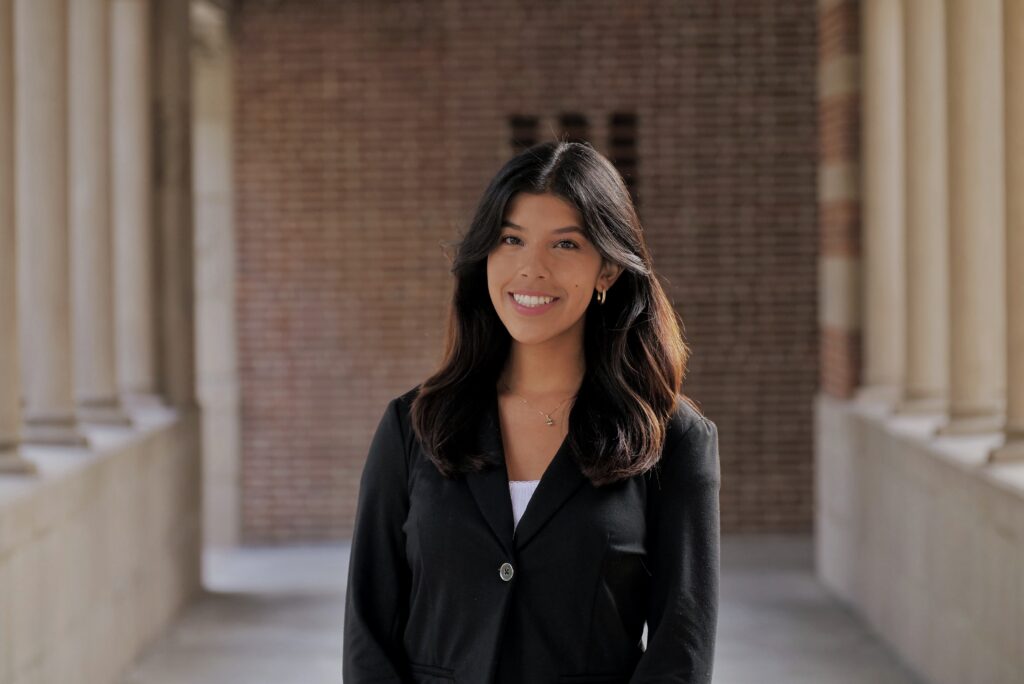
How do you hope to make a difference in environmental health? I intend to spread awareness about environmental health issues and emphasize their impact on marginalized communities. This includes influencing policy changes and participating in community-based initiatives. I also strive to improve the accessibility of scientific findings for all audiences by bringing artistic perspectives into the conversation and providing visual representations of data to engage a broader audience. Overall, I hope to fight for the betterment of environmental health in my community.
What led you to pursue the EH MATTERS internship? Growing up in Los Angeles, I witnessed firsthand the impact of environmental injustices on vulnerable populations. Therefore, this program aligns perfectly with my goals of pursuing a
career in medicine while addressing the environmental determinants of health.
How do you see this program helping to drive your future? As a pre-med student, EH Matters is preparing me to offer well-rounded care to patients by considering both medical and environmental factors affecting health. Understanding the entire background of an individual is crucial to optimal patient care. This program creates a community of like-minded individuals, opening doors for more opportunities, and future collaborations between us all. Looking ahead, I envision my continued involvement in various scientific fields, with EH MATTERS serving as a platform for community outreach and research opportunities at USC.
How do you want to make a difference in public health/environmental health outside of the classroom? By becoming a more informed advocate for my community, I can use my newfound knowledge and resources to empower others to make informed decisions about their health. I also wish to serve as an inspiration to others from similar backgrounds who aspire to pursue careers in environmental health research, and STEM as a whole.
What message would you like to share with other students wanting to pursue an internship in environmental health? If you are even remotely interested in environmental health, I recommend digging deeper and narrowing down the source of your excitement. From there, the passion will build and inspire you to pursue all kinds of internships and opportunities!
What diverse perspective do you bring to EH science, why is it important to have diverse voices and experiences in EH? My cultural background offers a perspective rich in cultural sensitivity. My upbringing as a Peruvian-American, born and raised in Los Angeles, adds a cultural dimension that enhances my ability to deeply understand Latin American perspectives in research. It is important to have these diverse perspectives that can resonate with similar members of the community. This representation builds partnerships and trust between the two groups. This diversification also allows for underrepresented groups in STEM to pursue their passions with support from peers and experienced faculty.
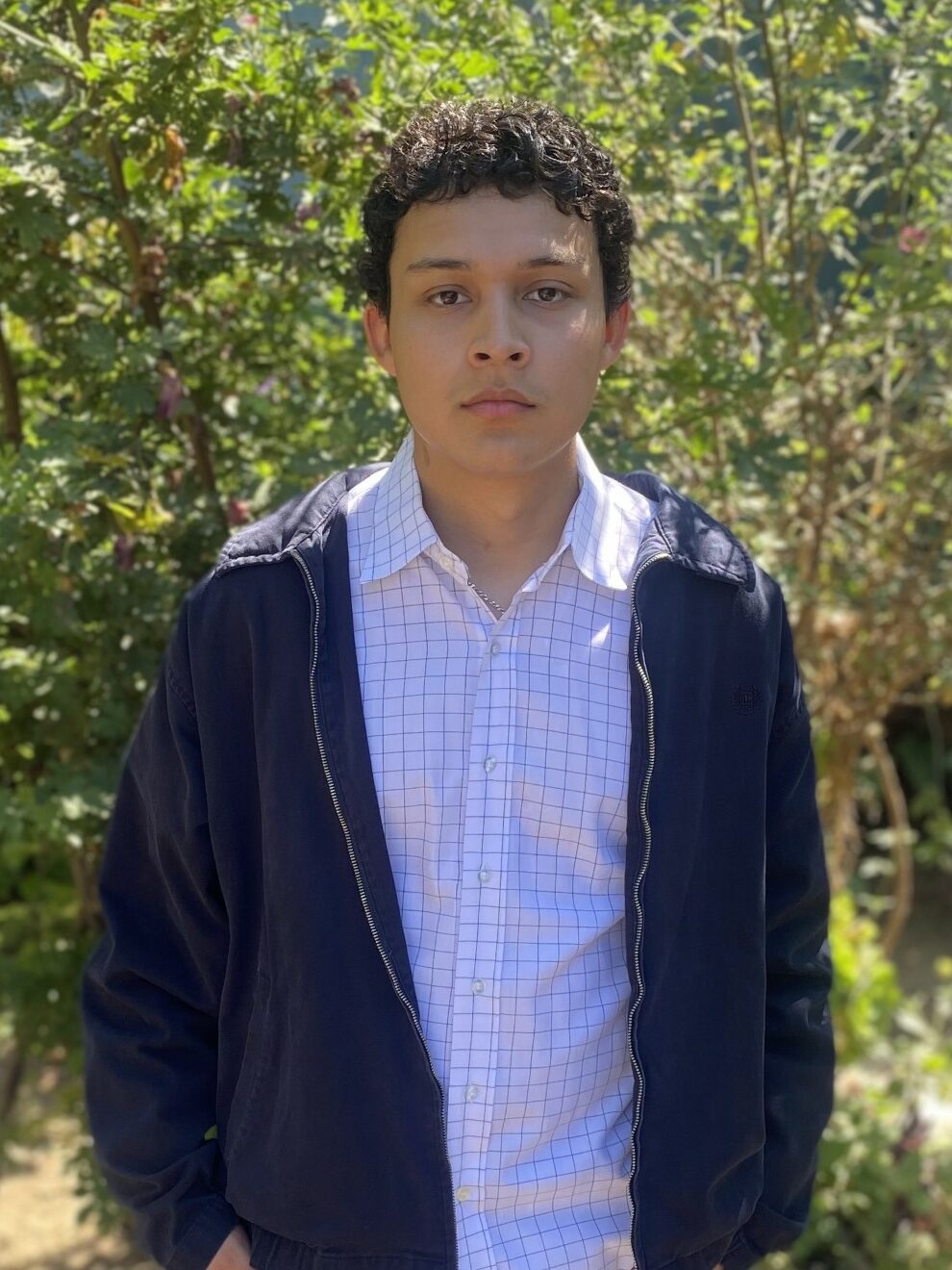
How do you hope to make a difference in environmental health? I hope to make a difference in environmental health through landscape architecture. Under the lens of environmental justice, I plan to alter the dynamic of disproportionately affected communities by promoting sustainable design to simultaneously mitigate the effects of climate change and counter previously embedded destructive planning practices.
What led you to pursue the EH MATTERS internship? The emphasis on community engagement and working closely with grassroots environmental justice organizations greatly caught my interest. As someone with the intention of working with similar neighborhood alliances in the near future to positively impact change through equitable design, gaining exposure in my undergraduate tenure is especially beneficial.
How do you see this program helping to drive your future? Participating in EH matters will allow me to familiarize myself with the process of conducting individual research to properly formulate ideas and subsequent solutions, which will prove to be crucial when pursuing a design-based profession. Through the program's mentorship opportunity, I will obtain an understanding of participating in research to better equip me for my journey through higher education.
How do you want to make a difference in public health/environmental health outside of the classroom? As previously mentioned, my professional interests involve upholding environmental equity through landscape architecture and sustainable environmental design. More specifically, I plan to work locally with communities to increase access to green space including urban agriculture and gardening, interactive/educational nature, urban parks, and school neighborhood design. Through these efforts, I hope to mitigate the effects of climate change and its effects on marginalized communities while simultaneously offsetting historical malicious city planning.
What message would you like to share with other students wanting to pursue an internship in environmental health? Achieving the goal of equitable environmental health is an effort that will encompass individuals from a myriad of disciplines - meaning that there is a need from all fields! Do not be discouraged to apply for an opportunity that might not conventionally entail your expertise, sometimes a different perspective is necessary and in turn more desirable!
What diverse perspective do you bring to EH science, why is it important to have diverse voices and experiences in EH? Growing up in East Los Angeles has exposed me to disproportionate environmental issues; whether that be the obstruction of connectivity and toxicity at the behest of highway construction, inability to engage in bicycle transportation, and lack of engaging green space. First-hand experiences and those shared by neighbors have shaped my general ambition to enhance public infrastructure and reconstruct historically marginalized communities of Los Angeles. My personal background as a native Angelino, along with other cohort members, brings an integral perspective that is desperately needed to accurately recognize the issues experienced by low-income neighborhoods and address their needs/wants.
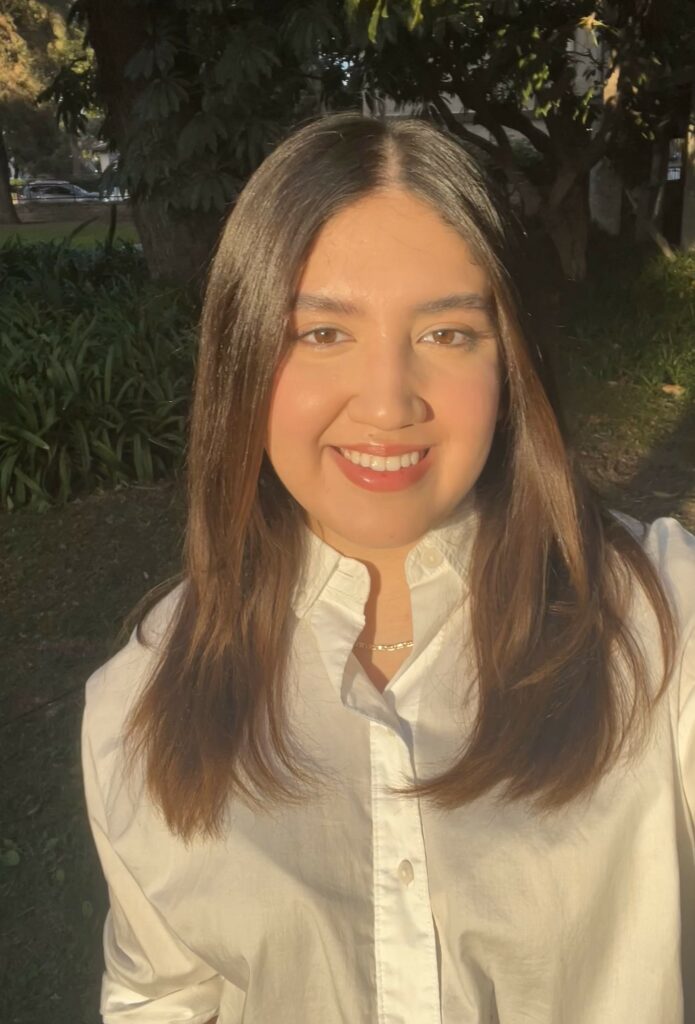
How do you hope to make a difference in environmental health? The environment around us has a significant impact on many aspects of our development, such as our health and well-being. Growing up in a predominantly Latino community that was affected for many years due to a residing power plant, I was able to take note of the impact harmful environmental conditions can have on the health of those exposed to them. Through my time in EH Matters, I hope to join a community that can help me garner the necessary education and abilities to contribute to research that can prevent exposure to harmful environmental factors that pose health risks. I hope that eventually, those research findings can make a difference by inciting change, whether it be in community members, corporations, or legislation towards safer environmental conditions.
What led you to pursue the EH MATTERS internship? In learning about the EH Matters internship, I chose to apply and become a part of this program due to its help to communities harmed by pollutants and environmental stressors in Los Angeles. In addition, I was drawn in by the efforts of EH Matters to introduce underrepresented students to environmental health research. I valued its acknowledgment of the importance of bringing together diverse perspectives and ideas in the learning of inequalities in environmental health through findings of disparities in exposure and health outcomes. Ultimately, it made me want to take my experiences, knowledge, and determination to help push toward research breakthroughs that can change public policy and bring awareness to the pressing environmental issues in Los Angeles and the world.
How do you see this program helping to drive your future? The COVID-19 pandemic’s effects on underserved communities shone a light on many disparities in healthcare. I began to recognize that in my journey to becoming a physician, I needed not only a thorough knowledge of medicine but of the issues affecting the health of communities to treat and work with patients properly. I realized that this included becoming well-versed in the environmental factors that harm the health of underrepresented and underserved communities. I believe through EH MATTERS, I can have the opportunity to make memorable experiences that can educate me in multiple areas of environmental health, sciences, and health disparities. Then, maybe one day I can become a physician who is knowledgeable in healthcare, environmental health, and capable of conducting research that can inspire the change of environmental factors that negatively affect low-income communities of color and sustain healthcare disparities.
How do you want to make a difference in public health/environmental health outside of the classroom? Environmental health is a subject of great importance which is evidenced by the impacts many people experience in their health due to global warming. As individuals on this Earth, awareness of the environmental factors that affect our health is essential. By participating in this program, I want to form part of research that can help people grow awareness of the environment's impact on their well-being. Learning about the role the environment plays in health allows individuals to recognize existing problems and make significant efforts for solutions and changes. Through new approaches, people
can take on this changing world.
What message would you like to share with other students wanting to pursue an internship in environmental health? Believe in yourself. I know it is probably something you may have heard thousands of times by many in passing, but truly my piece of advice is to stop, take those words, and place them in your heart. Remember all the things you have had to overcome to get to where you are now. By doing so, I hope it can help you believe in your abilities and your strengths. Believing in yourself is a powerful thing that can truly take you anywhere you desire. If you love learning about environmental health and helping in the well-being of communities, believe in yourself and pursue an internship in
environmental health!
What diverse perspective do you bring to EH science, why is it important to have diverse voices and experiences in EH? Diversity is essential in any project. Diversity allows projects to acknowledge different perspectives, gain creative ideas, learn new concepts, or ways to interpret situations, issues, events, etc. As a first-generation Mexican-American woman, I hold various ideas, experiences, and interpretations that I believe can be beneficial when working in environmental health research. I grew up in a predominantly Latinx neighborhood known for its small businesses and appreciation for the beauty and creativity of Mexican culture. In addition, it was also known for its long fight for environmental justice. For many years, my neighborhood sat next to a power plant that released toxic fumes that angered residents due to the health effects it would have on their loved ones and neighbors. This caused community members to take action and demand better air quality in our community. Listening to and seeing the efforts for quality air conditions in our neighborhood allowed me to grow up recognizing both the value of a healthy environment and the disparities in exposure to harmful pollutants. I want my experiences growing up in my community and as a first-generation Mexican-American young woman to contribute to environmental health research and make an impact in EH MATTERS.
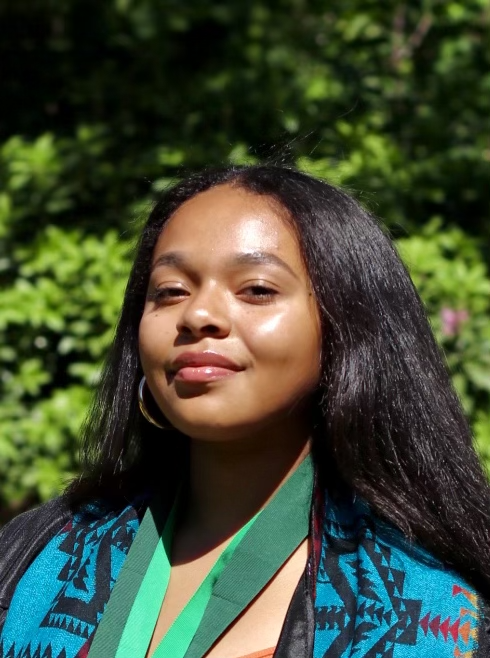
How do you hope to make a difference in environmental health? I hope to bring awareness to the inequities of environmental health. Before being exposed to the research surrounding how the environmental crisis affects communities even in what could be deemed as simplistic ways, I never noticed the major disparities in the environmental health of certain communities. I thought the “global” problem of global warming meant everyone was going through the same experience but indeed this is wrong. Due to a multitude of factors including race, class, and location different groups of people are being affected in different ways. Bringing awareness that this is evident and happening is the first step in making a difference.
What led you to pursue the EH MATTERS internship? Realizing how close to campus these environmental health disparities are is what particularly led me to learning about the EH MATTERS internship. Being from Oregon where greenery is everywhere I never took mind to how having access to plant life has become a privilege in today's climate. Learning about this, as someone who's been drawn to advocating for others, I felt that this internship would lead me towards understanding the new community I’m a part of in order to advocate on behalf of them.
How do you see this program helping to drive your future? This program helps to drive my future through the exposure of experts in a plethora of fields who are passionate about the community and work they do, as part of the EH Matters program. I see this program driving my future in how I will choose to interact with policy as a policy maker or as someone who will have to work alongside policy implementers.
How do you want to make a difference in public health/environmental health outside of the classroom? I hope to bring the efforts of community based research, lab based research, and advocacy together in the process of forming policy that will better the surrounding communities. All of these components overlap one another in the process of creating change which at times make it difficult but it’s what makes good policy thorough and effective. I hope to be a bridge between these components, in the process of creating a difference.
What message would you like to share with other students wanting to pursue an internship in environmental health? A message I would like to other students wanting to pursue an internship in environmental health is to firstly go for it! Apply for the program, research your options, and most importantly do not close the door on yourself before you even try. Regardless of past experience or knowledge, go into this internship or others with intentionality and curiosity. You’ll never know what might catch your attention and affect your future or someone else's.
What diverse perspective do you bring to EH science, why is it important to have diverse voices and experiences in EH? As a Afro-Indigenous American I’ve often been curious about the historical knowledge surrounding environmental health because both of the communities I’m a part of are known to have a complicated relationship with the environment. Including experiencing both the harm and repairment of the environment, indigenous and black communities have continued to live through. I bring with me this experience and knowledge into the spaces EH fellows allows me to be in.